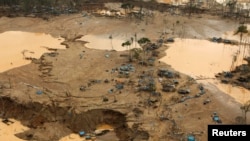Peru's new environment minister said on Wednesday the government of President Pedro Pablo Kuczynski would focus on preventing pollution rather than fining companies after the fact, part of a more collaborative stance she described for the private sector.
Elsa Galarza, a U.S.-trained economist who previously headed the research unit at Lima's University of the Pacific, said that previous administrations tended to mistrust companies instead of helping them navigate environmental rules.
"Since the regulations are so profuse, many companies don't know they're breaking them," Galarza told Reuters in a brief interview. "There need to be mechanisms to help companies, to alert them. 'Look, you need to comply with this and you're not, what do you need? How can we help you?'"
Several global miners, including Newmont Mining Corp., Southern Copper Corp. and the Aluminum Corp. of China, operate in Peru, where conflicts over water and pollution often erupt in far-flung villages. Peru is also home to melting glaciers in the Andes, more than 10 percent of the Amazon rainforest and at least 2,000 km (1,240 miles) of Pacific coastline.
Galarza said the process of assessing environmental damage and levying fines would become more transparent during Kuczynski's five-year term, so companies get a better grasp of the grounds for sanctions.
"Obviously that doesn't mean that we're not going to punish whomever needs to be punished," Galarza said. But "we don't want to fine companies, we want to keep them from doing environmental harm."
The more business-friendly tone comes as Kuczynski, a former investment banker who took office on July 28, has vowed to bolster private investments that have declined for three years straight.
Kuczynski has called Peru's air quality standards "unrealistic" and proposed lowering them to spur new smelters that could add value to Peru's exports.
Galarza said her ministry had started a review of air and water quality standards that could result in changes, perhaps next year. But she said the review aimed to ensure all standards were scientifically sound, not necessarily to lower any.
"It's a very technical topic," Galarza said. "I couldn't tell you now what the result will be."
Galarza said she was also open to studying whether Peru might process copper concentrates with high levels of arsenic, as Kuczynski has suggested as part of a plan to revive a polymetallic smelter.
"Anything's possible and we can't close the door to receiving proposals," Galarza said.





